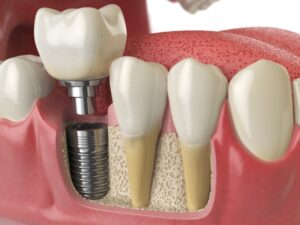
Dental implants have become a reliable and popular solution for replacing missing teeth, offering both functional and aesthetic benefits. When placed correctly and cared for properly, they can last for many years—often multiple decades. However, like any medical procedure, dental implants aren’t without risk. In rare cases, complications can arise, and knowing how to recognize the early signs of implant failure can make all the difference in preserving your oral health. Learn more about the common indicators of dental implant failure, the potential causes behind them, and what steps you should take if you suspect something isn’t quite right.
What Causes Dental Implants to Fail?
Implants can fail for a number of reasons, including infection, poor oral hygiene, inadequate bone support, gum disease, smoking, and chronic health conditions. Smart, at-home dental care can mitigate some risks of failure. Daily brushing and flossing are a must, as is eating the right foods and drinking plenty of water. Dentists can prescribe antibiotics to fight infection after your procedure, and smart choices like avoiding smoking and overall health maintenance can increase your chances of implant success.
How Do I Know If My Implant Fails?
Dental implant failure can occur when the jawbone fails to integrate with the implant (osseointegration) shortly after placement, or when complications like infection or bone loss arise years after integration, leading to loosening or movement of the implant.
Most often, the tell-tale sign of failure is a loose or wobbly feeling in the implant. If the implant doesn’t fuse with the bone, there won’t be a stable feeling there. You might feel the implant move when you chew or talk. Other signs of failure may include pain, swelling, or infection of the implant site.
What Can I Do if My Implants Fail?
It is important that if you do suspect failure of your implant that you contact your dentist as soon as possible for treatment and available options.
If your tooth replacement can’t be salvaged, don’t lose hope just yet! A failed dental implant can be removed while under local anesthesia. If you’ve experienced bone loss around the implant site, your dentist might recommend a bone graft to improve the bone density and mass and increase chances that your implant will integrate successfully the next time. A bone graft takes healthy bone tissue from another part of your body or a synthetic graft and transplants it to where it’s needed: in this case, your jawbone.
How Can I Care for My Implants So They Don’t Fail?
Getting out ahead of any problem is always the best fix, and so it goes with caring for your new implants. Discuss any changes to your health or medications you’re taking with your dentist – it can affect healing and the integration process. Make two trips a year to the dentist for checkups and cleanings; examinations can allow your dentist to spot early warning signs of complications. Brush for two minutes twice a day and floss at least once, and use mouthwash regularly.
Get the most out of your investment in your oral health. Take care of your implants and alert your doctor at the first sign of failure!
About the Practice
United Dental Centers of Whiting delivers personalized care in a positive, friendly, and comfortable environment. Our team of professionals can handle all your dental needs, whether you need a simple checkup and cleaning or want to restore your entire smile! Looking for a solution for missing teeth? We have an experienced periodontist on staff who can offer start-to-finish dental implant treatment. Visit us today online or call our office at (219) 659-4900.
